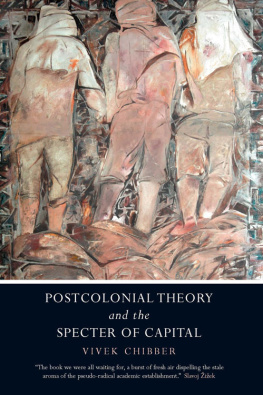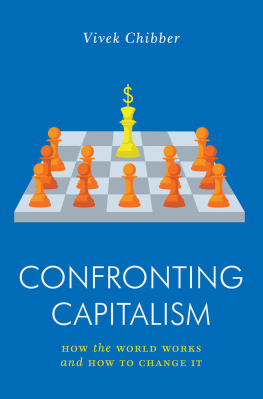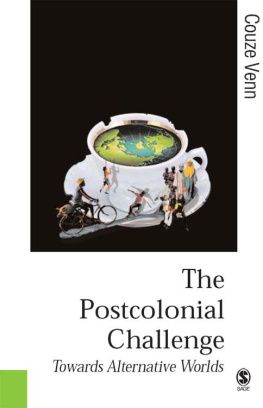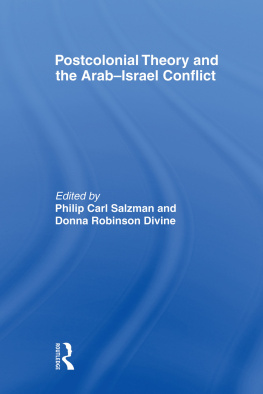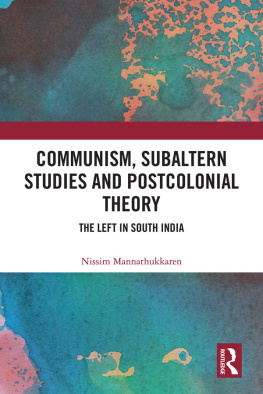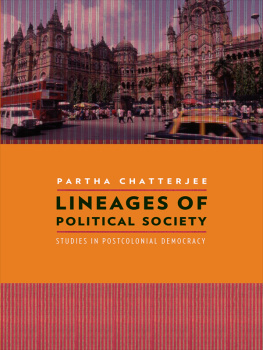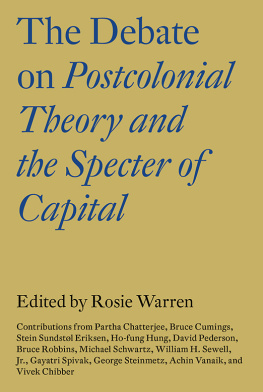VIVEK CHIBBER teaches Sociology at New York University. He has contributed to, among others, the Socialist Register, American Journal of Sociology, Boston Review and New Left Review. His book Locked In Place: State-Building and Late Industrialization in India won the 2005 Barrington Moore Book Award and was one of Choices Outstanding Academic Titles of 2004.
Postcolonial Theory and
the Specter of Capital
Vivek Chibber


First published by Verso 2013
Vivek Chibber 2013
All rights reserved
The moral rights of the author have been asserted
Verso
UK: 6 Meard Street, London W1F 0EG
US: 20 Jay Street, Suite 1010, Brooklyn, NY 11201
www.versobooks.com
Verso is the imprint of New Left Books
British Library Cataloguing in Publication Data
A catalogue record for this book is available from the British Library
Library of Congress Cataloging-in-Publication Data
Chibber, Vivek, 1965
Postcolonial theory and the specter of capital / Vivek Chibber.
pages cm
Includes bibliographical references and index.
ISBN 978-1-84467-977-5 (hardback : alk. paper)
ISBN 978-1-84467-976-8 (pbk. : alk. paper)
ISBN 978-1-781-68255-5 (e-book)
1. PostcolonialismDeveloping countries.
2. CapitalismDeveloping countries. I. Title.
JV51.C475 2012
325.3dc23
2012040848
Typeset in Minion Pro by Hewer Text UK Ltd, Edinburgh
Printed by in the US by Maple Vail
For Nivedita
Contents
This is not a book I was especially keen to write. It was perhaps 2004 that Tariq Ali, during a visit to New York, suggested I write something on postcolonial theory for Verso. At the time, I demurred. The reason, I must admit, was not very exalted. I simply did not believe there was any point to it. The intellectual culture, in both the West and the East, did not have space for a serious engagement with postcolonial theory. To have presented a critique, no matter how careful, would probably have been to no avail. So I politely declined the offer and set about researching what, at the time, I regarded as more pressing subjects.
The change came around 2005, when I was approached by Rina Agarwala and Ron Herring to write a chapter on the decline of class analysis in South Asian studies, for a special issue of the venerable Critical Asian Studies. I agreed to do so, focusing on the Subaltern Studies series as the emblem of both the turn away from class and the embrace of postcolonial theory. That essay was basically an exercise in the sociology of knowledge; it sought to foreground the social conditions behind the rise of postcolonial studies and its displacement of Marxism, but never actually engaged the arguments coming from the Subalternist camp. Still, as several readers pointed out to me, the tone of the article made clear that my view of the phenomenon was unfavorable. This created a dilemma. I had published an article suggesting that the eclipse of class analysis was regrettable, but had given no grounds for anyone to share my sentiments. If I thought Subaltern Studies was flawed as a theoretical project, then it seemed incumbent on me to explain why. Was it not possible that class analysis of the traditional kind had been eclipsed because it should have been? I began to feel that the publication of that article tied my hands. I would have to write the book I had been avoiding.
In 2007 I started working on it, expecting that the manuscript would be ready sometime in 2008. That year, however, witnessed the illness and death of my father and mother-in-law, both in Delhi, both of whom passed away within a month of each other from cancer. It was not until 2009 that I was able to return to the book. Once I started working on it, though, it became clear that it would have to be longer than I had envisioned. To criticize the core ideas of Subaltern Studies, and to do so in a way that took those ideas seriously, would require a substantial tome. Not until the end of 2011 did I finally finish.
During the years I spent working on this project, the support of friends and comrades has been essential. Jeff Goodwin, Robert Brenner, and Erik Wright read the whole manuscript. Jeff has been an ideal colleague at New York University, a constant source of good humor and a pillar of moral integrity. Bob, for years, has been both a friend and an interlocutor. He read every chapter but was especially vigilant and helpful with chapter 3. Erik had detailed comments, as usual, on the whole manuscript, and prompted a substantial rewriting of parts of chapter 7. Anwar Shaikh took time off from writing his own book to read my argument about abstract labor in chapter 6; Duncan Foley read that same chapter, and I am grateful to both of them for their help. I tease Anwar that, owing to his association with this book, his links with academics of South Asian descent will only become more tenuousbut it seems he is willing to take that risk. To Neil Brenner goes the lions share of credit for the books title. Over lunch, after I bemoaned my inability to think of a suitable title, he came up, within a minute, with Postcolonial Studies and the Specter of Capitalism. I tweaked it a bit, but the title is basically his. At the eleventh hour, a group of graduate students read the whole manuscript and willingly served as my own little focus group; hence, my thanks to Jonah Birch, Mark Cohen, Rene Rojas, Jason Stanley and Adaner Usmaniespecially to Adaner for his very detailed, and very astute, written comments. Conversations with Leo Panitch and Greg Albo not only helped develop my thoughts but also kept my morale buoyed when the books toll felt excessive. In Sebastian Budgen I have been fortunate to have not only a superb editor, but also a friend and comrade. Sebastian was among the first to suggest my writing this book, and waited patiently for me to come around. May every author be so fortunate. And Avis Lang was not only an exceptional copy-editor but an enthusiastic supporter.
I owe a special debt of gratitude to Bashir Abu-Manneh. During the past decade, Bashir has not only become a dear friend and comrade, but has insisted that I write this book. He read the whole manuscript with an eagle eye, bringing to it not merely his general knowledge of the field, but also his particular expertise on its instance in Middle East studies.
My daughter, Ananya, was mildly disappointed to learn that I would not be dedicating this book to her, but when I explained why, and informed her who the beneficiary of the dedication would be, she graciously offered her blessing. Th at beneficiary, of course, is Nivedita Majumdar, to whom I owe my greatest debt. One of the very first conversations we had, when we met in 1995, was on the subject of postcolonial studies. Niveditas unshakable confidence in the same Enlightenment universals that the Subalternists denigrate has been like an elixir during the time I have struggled with this book. It is as a small token of my love and wonderment that I dedicate this book to her.
The article was published as On the Decline of Class Analysis in South Asian Studies, Critical Asian Studies 38:4 (2008), 25787. This was a special issue edited by Ronald Herring and Rina Agarwala, which they also published as an anthology under the title Whatever Happened to Class? Reflections from South Asia (London: Routledge, 2008).
Over the past two decades, postcolonial studies has acquired considerable visibility in academic circles. Its point of origin was in literary and cultural studies, where it started as a movement to transcend the marginalization of non-Western literatures in the canon. On this count, the campaign experienced enormous, and rapid, success. By the turn of the millennium, the conventional packaging of modern literary training had expandedat least at many elite American universitiesto include the works of authors as diverse as Ngg wa Thiongo, Aim Csaire, Salman Rushdie, and Gabriel Garca Mrquez. This was a remarkable and salutary achievement in its own right, and had the influence of postcolonial studies been limited to this, it would have certainly merited real attention. But its significance would have been limited. Most likely it would have been understood as a current which, while no doubt important for widening the perspective of its field, nonetheless remained part of the internal story of an academic specialtyno more worthy of attention than any other scholarly trend. What set it apartand continues to do sowere two additional facts about its trajectory.
Next page
